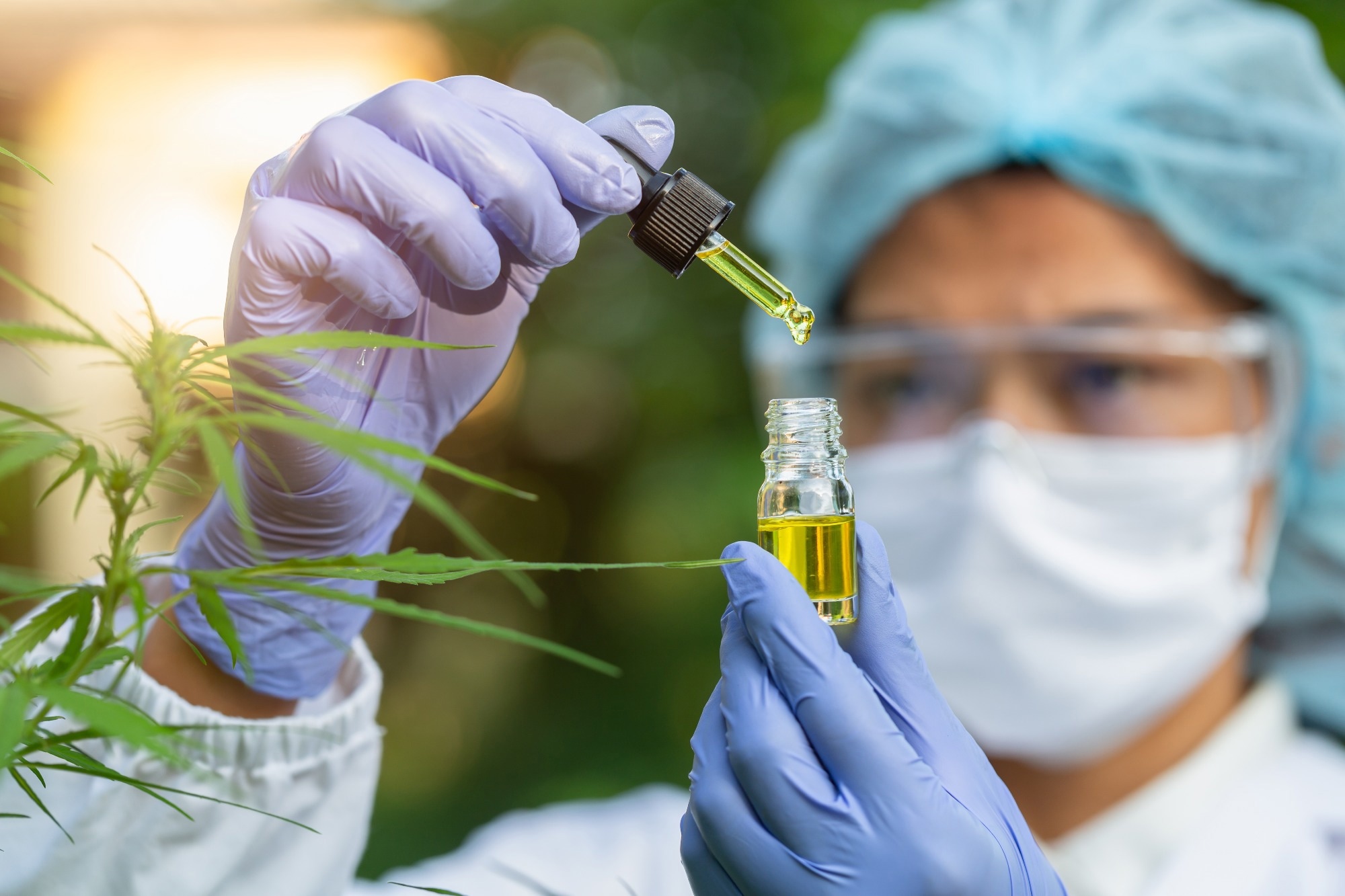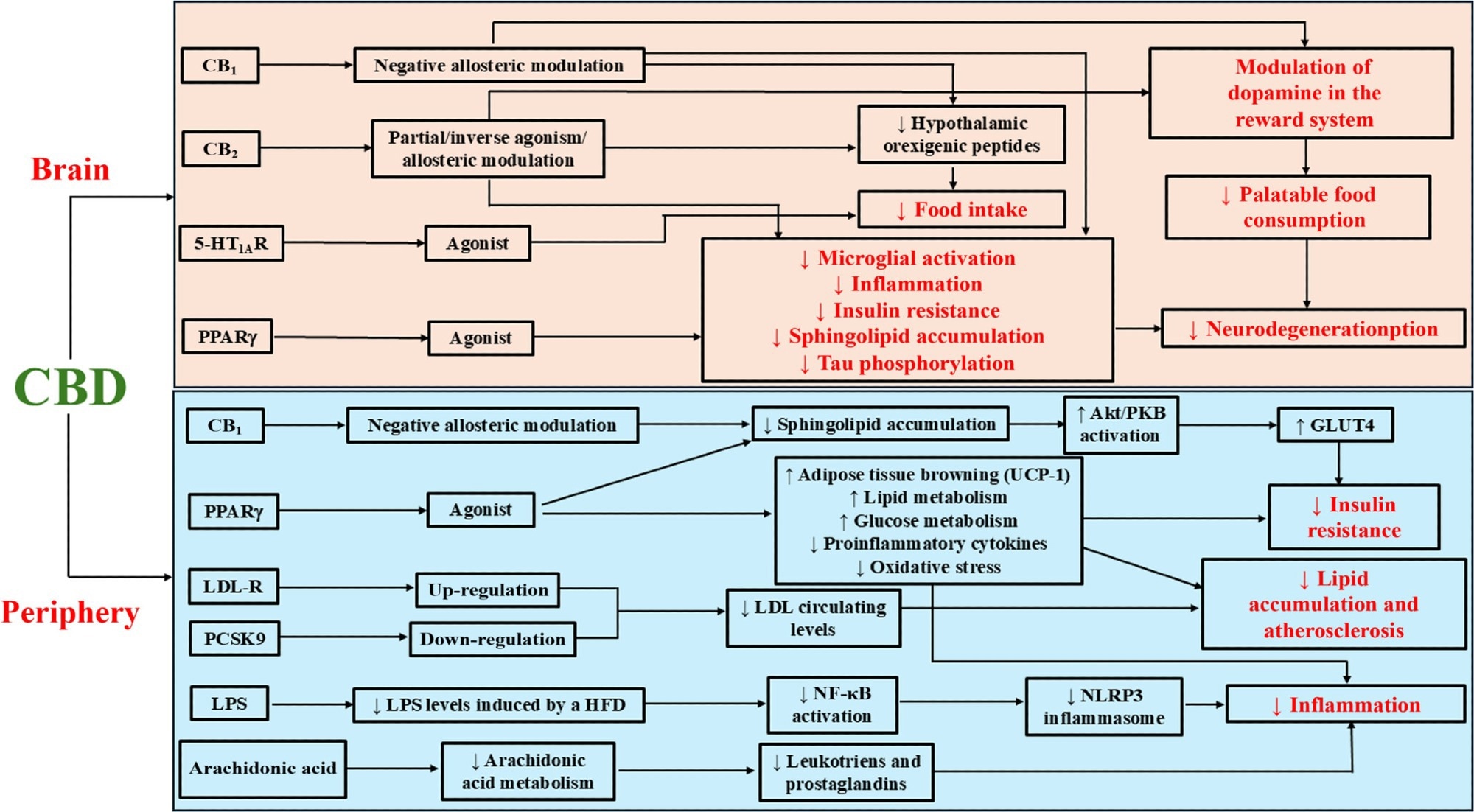Preclinical evidence points to CBD’s ability to curb overeating, improve metabolic health, and reduce inflammation, but researchers stress that larger, well-controlled human studies are essential before it can be considered a treatment option.

Is there a role for cannabidiol in obesity, metabolic syndrome and binge eating? Image Credit: Tinnakorn jorruang / Shutterstock
In a recent review in the British Journal of Pharmacology, researchers discussed the potential role of cannabidiol (CBD), a non-intoxicating compound derived from Cannabis sativa, in regulating obesity, metabolic syndrome, metabolism, and food intake.
Current evidence suggests CBD may improve lipid and glucose metabolism, reduce overeating, potentially influence binge-type eating behaviors, ameliorate obesity-related psychiatric features in preclinical models, and lower inflammation.
Potential of CBD for Addressing Obesity
Obesity is a chronic and multifactorial disease that significantly compromises health and quality of life, affecting more than 890 million adults globally as of 2022. This "obesity pandemic" is closely linked to metabolic and cardiovascular disorders, musculoskeletal and neurological conditions, mood disturbances, and certain cancers.
Standard management typically begins with lifestyle changes, such as diet and exercise, although severe cases often require pharmacological or surgical interventions. Past drugs for obesity were limited by poor efficacy or adverse effects, while newer incretin-based therapies such as semaglutide and tirzepatide show strong outcomes but with tolerability issues.
CBD has emerged as a potential obesity treatment based on its effects on body weight, metabolism, and eating behaviors.

Schematic representation of the most important targets, mechanisms, and outcomes of CBD in the context of appetite regulation, obesity, and metabolic syndrome. This scheme illustrates some of the most important biological targets and mechanisms of CBD in obesity and metabolic syndrome that have been discussed in the present manuscript. In the brain, CBD reduces food intake through the interaction with the CB1, CB2 and 5-HT1A receptor (R), which possibly results in decreased activity of hypothalamic orexigenic neuropeptides. Also, the interaction with CB receptors leads to a profound modulation of dopamine signalling in the brain reward system, that results in the reduction of palatable food intake. Targeting the PPARγ and CBs, CBD attenuates microglial activation, neuroinflammation, insulin resistance, sphingolipid accumulation and neurodegeneration. In peripheral tissues, CBD decreases insulin resistance and improve dyslipidaemia, through mechanisms that involve the negative modulation of the CB1 receptor, which decreases sphingolipid metabolism, and stimulation of the PPARγ, which results in browning of the adipose tissue, improved glucose utilization and improvement in lipid metabolism. CBD also ameliorates dyslipidaemia, up-regulating the LDL-R and down-regulating the PCSK9, thus decreasing the circulating levels of LDL cholesterol. Finally, targeting the PPARγ and decreasing LPS levels and arachidonic acid metabolism, CBD exerts a strong anti-inflammatory activity. All these mechanisms appear interrelated and multiple targets participate in CBD-related beneficial outcomes. This supports the therapeutic potential of CBD in treating obesity and obesity-associated metabolic alterations. 5-HT1AR, 5-HT1A receptor; AKT/PKB, protein kinase B; CB1 receptor; CB2 receptor; CBD, cannabidiol; CBs, cannabinoid receptors; LDL, low-density lipoprotein; LDL-R, low-density lipoprotein receptor; LPS, lipopolysaccharide; NF-kB, nuclear factor kappa-light-chain-enhancer of activated B cells; NLRP3, nucleotide-binding domain like receptor protein 3; PPARγ, peroxisome proliferator-activated receptor gamma, PCSK9, proprotein convertase subtilisin/kexin type 9; UCP-1, uncoupling protein 1.
Biological Interactions of CBD
CBD acts primarily through the endocannabinoid system (ECS), which regulates mood, appetite, energy balance, and immunity.
The ECS includes CB1 receptors in the brain, CB2 receptors in immune cells, endogenous ligands, and enzymes that control their synthesis and degradation. While CB1 influences cognition and metabolism, CB2 contributes to immune and neuroprotective functions.
CBD’s pharmacokinetics are shaped by poor oral absorption due to first-pass metabolism, though high-fat meals improve bioavailability. Sex-based differences are notable, with females generally showing higher plasma levels and tissue accumulation, suggesting the need for sex-specific dosing.
Pharmacodynamically, CBD acts on multiple targets, modulating CB1 and CB2 receptors allosterically, inhibiting FAAH to increase endocannabinoid levels, and interacting with serotonin, dopamine, opioid, and TRPV1 receptors. Importantly, CBD also inhibits several CYP450 enzymes, raising the possibility of drug-drug interactions that require clinical attention.
Preclinical Insights into Appetite and Weight Regulation
The ECS strongly influences appetite, with CB1 activation stimulating food intake, a mechanism once targeted by rimonabant, an anti-obesity drug withdrawn for psychiatric side effects. Unlike THC, CBD has low CB1 affinity but can still influence feeding through indirect mechanisms.
Animal studies yield mixed results. Some reports indicate that CBD reduces food intake, suppresses sucrose consumption, or slows weight gain, often through CB2 receptor activity. Others, however, find no significant effects or even increased intakes. Variability likely reflects differences in species, diet composition, dosing, and delivery methods. Notably, most preclinical work has been conducted in male animals, highlighting an important sex-specific research gap.
CBD may also interact with serotonin receptors and hypothalamic neuropeptides, affecting both homeostatic and reward-driven feeding behaviors. The review further highlights CBD’s role in reducing binge-like eating behaviors in animal models, where its actions on CB2 receptors and orexin pathways within the brain’s reward circuitry contribute to lower sucrose intake and reduced motivation for palatable foods. New derivatives further demonstrate weight-reducing effects in diet-induced and genetic obesity models.
Effects on Metabolic Regulation
Beyond appetite, CBD exhibits beneficial effects in animal models of metabolic syndrome, characterized by impaired glucose and lipid metabolism, insulin resistance, and chronic inflammation. As a negative allosteric modulator of CB1, CBD helps counteract the overactive ECS commonly associated with these conditions.
Studies show that CBD improves glucose utilization, enhances insulin sensitivity, reduces fasting plasma glucose levels, and protects pancreatic beta cells from inflammation. It also decreases ceramide accumulation in adipose tissue and muscle, a key factor in insulin resistance.
In the brain, CBD improves glucose metabolism, reduces tau phosphorylation, and activates PPARγ, suggesting potential benefits for diabetes-related neurodegeneration and Alzheimer’s disease.
CBD has a positive impact on lipid metabolism by reducing triglycerides, cholesterol, and hepatic inflammation, potentially counteracting dyslipidemia and atherosclerosis.
However, results are inconsistent, with some adverse outcomes observed when CBD-rich extracts were used instead of purified CBD. This suggests that other cannabis constituents may alter outcomes, underscoring the need for standardized protocols. In addition, animal studies indicate that CBD may mitigate metabolic and neuroinflammatory damage in offspring of obese mothers, pointing to possible intergenerational benefits. CBD has also been reported to have a modest influence on gut microbiota composition, although findings remain preliminary and require further investigation.
Human Evidence and Future Directions
Human studies remain limited and inconsistent compared to preclinical data. In a randomized trial among patients with type 2 diabetes, CBD supplementation did not significantly improve metabolic outcomes, though it altered hormones such as resistin and gastric inhibitory peptide (GIP). The review notes that mechanistic research into CBD’s effects on incretin hormones, such as GLP-1 and GIP, remains very limited and is a priority for future work.
Another trial in healthy men reported no changes in glucose or insulin levels, while a recent study in overweight adults showed reduced insulin and triglyceride levels when CBD was taken after a meal. These results reinforce the importance of dosing conditions, as food enhances CBD absorption.
A sublingual spray combining CBD with low-dose THC improved glucose tolerance, insulin resistance, and lipid profiles in type 2 diabetes patients, though this complicates attributing effects solely to CBD. Across trials, CBD was generally well tolerated, with no major adverse events.
Conclusions
Overall, CBD shows promise for reducing food intake, improving glucose and lipid metabolism, and exerting anti-inflammatory and neuroprotective effects in preclinical studies. However, translation to humans remains incomplete.
Its broad molecular activity and favorable safety profile make it an intriguing candidate for managing obesity and related metabolic disorders, binge-type eating behaviors, maternal obesity, and possibly gut microbiota-linked mechanisms, but rigorous, well-controlled clinical trials are essential before CBD can be recommended as a therapeutic option.
Journal reference:
- Botticelli, L., Micioni Di Bonaventura, E., Einaudi, G., Provensi, G., Costa, A., D’Addario, C., Cifani, C., Micioni Di Bonaventura, M.V. (2025). Is there a role for cannabidiol in obesity, metabolic syndrome and binge eating? British Journal of Pharmacology. DOI: 10.1111/bph.70196, https://bpspubs.onlinelibrary.wiley.com/doi/10.1111/bph.70196